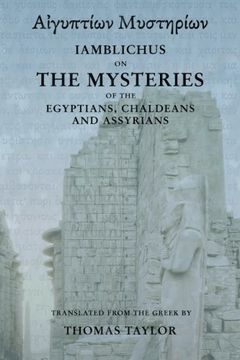Iamblichus on the Mysteries of the Egyptians, Chaldeans, and Assyrians (en Inglés)
Reseña del libro "Iamblichus on the Mysteries of the Egyptians, Chaldeans, and Assyrians (en Inglés)"
The present volume is a verbatim reproduction of Thomas Taylor's translation of Iamblichus's Egyptian Mysteries, originally published in 1821. The work is divided into two main parts: the "Epistle of Porphyry to Anebo" and the reply given him by the preceptor Abammon-the name assumed by Iamblichus, who was the real author of the reply. The latter is itself divided into ten sections, each treating of a series of related subjects raised by the questions posed in the epistle. Taylor provides an introduction and appends a collection of "additional notes" to the original text, both of which supply great insight into the nature and meaning of the mysteries discussed by Abammon. In the present edition, the formatting of the original has been changed in order to render the text more easily readable. The copious footnotes found in the original have been collected and placed in order at the end of the reply of Abammon, allowing for a more easily readable layout. In the margins we have added the pagination of the original edition, so that all references made to the original over the intervening centuries may be easily traced in the present volume, despite its altered pagination. Besides these changes, and minor changes in formatting style, the text has not been altered, except in cases where certain Greek characters were in need of modernization. "It appears to me that there are two descriptions of persons by whom the present work must be considered to be of inestimable worth, the lovers of antiquity and the lovers of ancient philosophy and religion. To the former of these it must be invaluable, because it is replete with information derived from the wise men of the Chaldeans, the prophets of the Egyptians, the dogmas of the Assyrians, and the ancient pillars of Hermes; and to the latter, because of the doctrines contained in it, some of which originated from the Hermaic pillars, were known by Pythagoras and Plato, and were the sources of their philosophy; and others are profoundly theological, and unfold the mysteries of ancient religion with an admirable conciseness of diction, and an inimitable vigour and elegance of conception."-Thomas Taylor, from the Introduction "The following testimony of an anonymous Greek writer, prefixed to the manuscript of this treatise proves that this work was written by Iamblichus: "It is requisite to know that the philosopher Proclus, in his Commentary on the Enneads of the great Plotinus, says that it is the divine Iamblichus who answers the prefixed Epistle of Porphyry, and who assumes the person of a certain Egyptian of the name of Abammon, through the affinity and congruity of the hypothesis. And, indeed, the conciseness and definiteness of the diction, and the efficacious, elegant, and divine nature of the conceptions, testify that the decision of Proclus is just.""-Thomas Taylor "There is no other dissolution of the bonds of necessity and fate than the knowledge of the Gods. For to know scientifically the good is the idea of felicity; just as the oblivion of good, and deception about evil, happen to be the idea of evil. The former, therefore, is present with divinity; but the latter, which is an inferior destiny, is inseparable from the mortal nature. . . . You must understand, therefore, that this is the first path to felicity, affording to souls an intellectual plenitude of divine union. But the sacerdotal and theurgic gift of felicity is called, indeed, the gate to the Demiurgus of wholes, or the seat, or palace, of the good. In the first place, likewise, it possesses a power of purifying the soul, much more perfect than the power which purifies the body; afterwards it causes a coaptation of the reasoning power to the participation and vision of the good, and a liberation from every thing of a contrary nature; and, in the last place, produces a union with the Gods, who are the givers of every good."-The Preceptor Abammon [Iamblichus]

